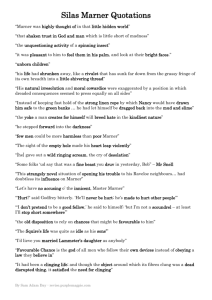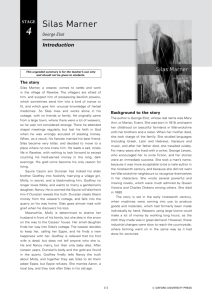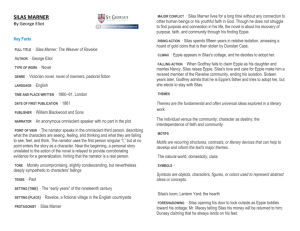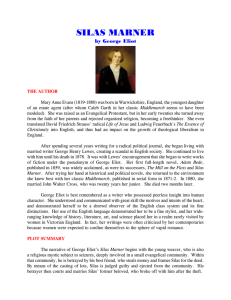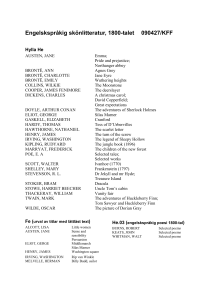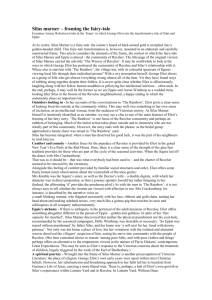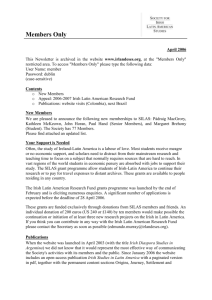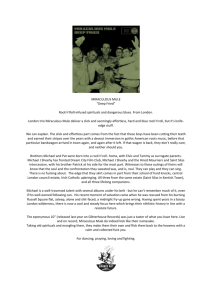Silas Marner: Culture of Life Book Review
advertisement
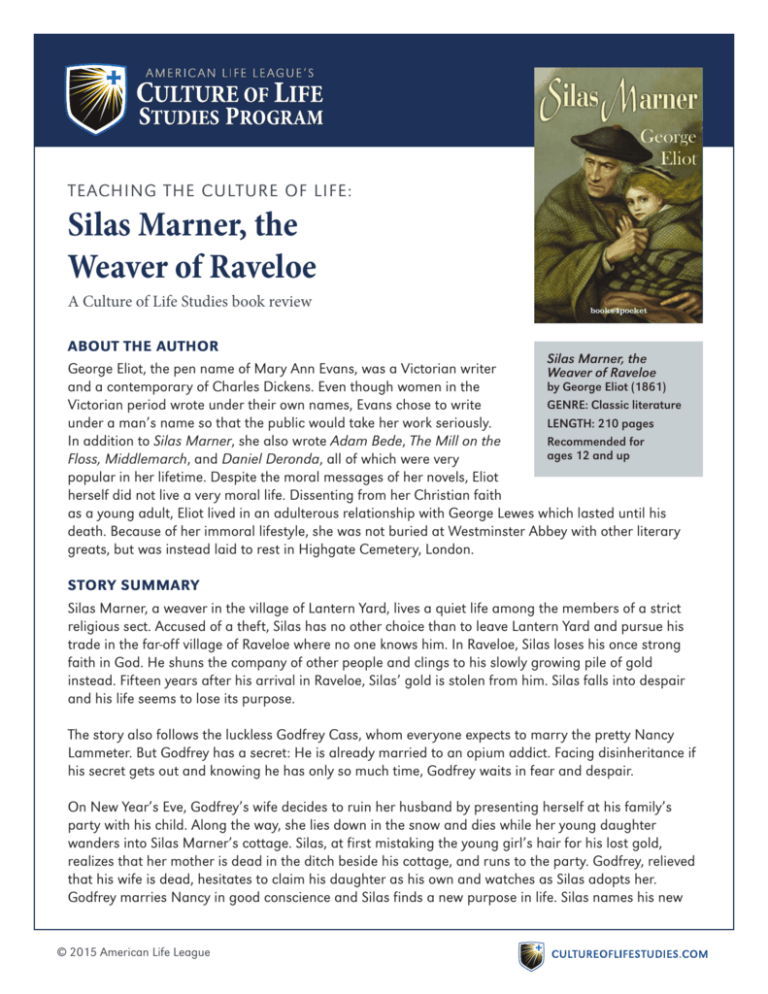
TEACHING THE CULTURE OF LIFE: Silas Marner, the Weaver of Raveloe A Culture of Life Studies book review ABOUT THE AUTHOR Silas Marner, the George Eliot, the pen name of Mary Ann Evans, was a Victorian writer Weaver of Raveloe by George Eliot (1861) and a contemporary of Charles Dickens. Even though women in the GENRE: Classic literature Victorian period wrote under their own names, Evans chose to write LENGTH: 210 pages under a man’s name so that the public would take her work seriously. In addition to Silas Marner, she also wrote Adam Bede, The Mill on the Recommended for ages 12 and up Floss, Middlemarch, and Daniel Deronda, all of which were very popular in her lifetime. Despite the moral messages of her novels, Eliot herself did not live a very moral life. Dissenting from her Christian faith as a young adult, Eliot lived in an adulterous relationship with George Lewes which lasted until his death. Because of her immoral lifestyle, she was not buried at Westminster Abbey with other literary greats, but was instead laid to rest in Highgate Cemetery, London. STORY SUMMARY Silas Marner, a weaver in the village of Lantern Yard, lives a quiet life among the members of a strict religious sect. Accused of a theft, Silas has no other choice than to leave Lantern Yard and pursue his trade in the far-off village of Raveloe where no one knows him. In Raveloe, Silas loses his once strong faith in God. He shuns the company of other people and clings to his slowly growing pile of gold instead. Fifteen years after his arrival in Raveloe, Silas’ gold is stolen from him. Silas falls into despair and his life seems to lose its purpose. The story also follows the luckless Godfrey Cass, whom everyone expects to marry the pretty Nancy Lammeter. But Godfrey has a secret: He is already married to an opium addict. Facing disinheritance if his secret gets out and knowing he has only so much time, Godfrey waits in fear and despair. On New Year’s Eve, Godfrey’s wife decides to ruin her husband by presenting herself at his family’s party with his child. Along the way, she lies down in the snow and dies while her young daughter wanders into Silas Marner’s cottage. Silas, at first mistaking the young girl’s hair for his lost gold, realizes that her mother is dead in the ditch beside his cottage, and runs to the party. Godfrey, relieved that his wife is dead, hesitates to claim his daughter as his own and watches as Silas adopts her. Godfrey marries Nancy in good conscience and Silas finds a new purpose in life. Silas names his new © 2015 American Life League daughter Eppie after his mother Hephzibah. With the help of his neighbor, Mrs. Winthrop, Silas raises Eppie as his own daughter. Sixteen years later, when the young Eppie is eighteen, Godfrey and Nancy realize that, having no children of their own, they will die without someone to inherit the estate and comforts they have built for themselves. Godfrey tells Nancy his secret, and the two go to Silas to persuade him to give up his adopted daughter. To their surprise, Eppie stays with Silas, and the squire and his wife return home sad and emptyhanded. Eppie, content to live among the working class of her community, marries Mrs. Winthrop’s son and lives a happy life with her father at their little cottage on the edge of Raveloe. LIFE THEME: THE GIFT OF CHILDREN Eliot begins the novel by giving us this quotation from William Wordsworth, which sets the stage for the theme of the novel: “A child, more than all other gifts That earth can offer to declining man, Brings hope with it, and forward-looking thoughts.” The plot of Silas Marner focuses on how children are a gift from God. The novel contrasts two main characters, Silas Marner and Godfrey Cass, who grapple with their secret pasts and navigate the everlooming future. Furthermore, the novel examines how they accept—or reject—the gift of children. As the characters discover throughout the novel, children are priceless and cannot be bought or sold. Silas understands that the gift of a child is more valuable than the amount of gold he lost. At first, Silas believes he has traded his beloved gold for Eppie, but he comes to realize that Eppie is more valuable to him than gold. In the end, Silas would rather have Eppie than all the gold in the world. With Eppie in his life, Silas becomes more giving, changing from a lonely miser to a loving, happy father. Young and handsome, Godfrey believes that a child would only ruin his life. He is so afraid of losing his reputation and his inheritance that he rejects his own daughter. His wealth matters more to him than his own child. Godfrey doesn’t abandon his daughter so that she can be adopted by the kind and loving Silas; he abandons her because her life is inconvenient to him at that point in his life. Sixteen years later, Godfrey and his wife Nancy long for a child of their own after a son is stillborn, but cannot agree on whether or not they should adopt. Without a child in their midst, the couple has a hard time hoping for a future. Godfrey wants to right his past wrongs by adopting Eppie, but he thinks he can only do that with money—by paying Silas for the return of his daughter. There is no doubt that the couple suffers greatly because of their infertility, but their mindset that children can be bought and sold at convenience is just like people today who treat children as a commodity. In his youth, Godfrey does not feel ready to be a parent, just like many couples today who choose abortion instead of life. Children are not objects. Children are human beings who deserve respect and love. HOW CAN I APPLY THIS TO MY LIFE? Like Silas, we must realize that each human life is priceless. We must do whatever we can do to make human life less of a commodity and more valued. Do you treat others as having value only as long as they are interesting or useful to you? Do you check your phone or text your friends in the middle of conversations with other people? When you are with someone, treat that person as if he is the most special person you have seen all day. Turn off your phone, don’t be distracted by outside stimuli, and try to have a © 2015 American Life League genuine conversation. Give the person your undivided attention and time. By being present to the people around you, you go a long way toward spreading a culture of life. DISCUSSION QUESTIONS 1. How does Eppie change Silas’ life? Little by little, Silas realizes that he has to adapt his life to suit the needs of his daughter. He socializes with the neighbors more, he goes outside to admire nature, and he goes to church. He has no love for the money he earns. For Silas, money is only valuable because it can give Eppie everything that Raveloe has to offer. 2. Does Godfrey Cass regret his decision to abandon his daughter? At first, he does not regret abandoning Eppie. He can see that she is well cared for by Silas. He also imagines that he will get a second chance to have more children with Nancy, which does not happen. Through his trials of infertility, he begins to realize that children are a gift. 3. Is Godfrey a bad person or does he simply lack the moral fiber and courage of Silas to be a good father? Godfrey is a virtuous well-respected person in his community, but he doesn’t like to be taken out of his “comfort zone.” Of the Cass brothers, Godfrey has the most moral conscience. He is at least inwardly perturbed about his secret marriage. But his worries don’t prevent him from doing what “feels good,” such as pursuing the pretty Nancy while he is still married. He doesn’t have the courage to own up to his mistakes or to accept the consequences for his actions because the results might make him uncomfortable. 4. How do each of these characters in the novel view adoption (Silas, Nancy, Godfrey, Mrs. Winthrop)? When he meets Eppie for the first time, Silas sees that she needs him. He looks at adoption and parenthood as his duty and he accepts Eppie as a gift from God. At the end of the novel, Nancy is still grieving for her dead baby. She believes in her simple country way that if God did not intend for her and her husband to have children, they should not seek out adoption. Godfrey feels conflicted about his earlier choice to abandon his own daughter. He desperately wants children, but he also wants to correct his past wrong now that his reputation is no longer at stake. He wants an heir to inherit his estate so that it won’t be turned over to strangers when he dies. Mrs. Winthrop sees that the hand of God is at work in Silas’ life with the arrival of Eppie. Just as God allowed Silas’ money to be taken, He allowed Eppie to enter Silas’ cottage. She also believes in doing what she can to help Silas raise Eppie by donating clothes and teaching Eppie homemaking skills. How does adoption help adopted children and adoptive parents? What should we do for adoptive families? Through adoption, a family gives everything it has to bring a new child into the family as one of its own, just as Silas does for Eppie. Adoption is costly, but it is also selfless. Adoptive parents can’t make it on their own, just as Silas could not raise Eppie without Mrs. Winthrop’s sage advice. As a community, we need to support families who have reached out in love to adopt. CATHOLIC CONNECTIONS Read 1 Timothy 6:10 What does the Bible say about the love of money? How has Silas’ love of money damaged his life? The Bible says that the love of money is the root of all evil. After leaving the village of Lantern Yard, Silas turns all his attention to money. He loses his previously strong faith in God and suffers in isolation, cut off from the rest of the citizens of Raveloe by his own choice. © 2015 American Life League
